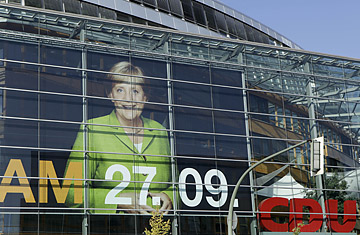
An election poster of German Chancellor Angela Merkel at the Christian Democrats' headquarters in Berlin on Sept. 23, 2009
In the unlikely event that Germans dump their popular Chancellor, Angela Merkel, in the country's election on Sept. 27, what would be the legacy of her four years in power? One key achievement, according to Volker Perthes, director of the German Institute for International and Security Affairs, is the Lisbon Treaty, which was designed to reform and streamline the workings of the European Union. "Without Merkel's involvement, and the role played by Germany, there would be no Lisbon Treaty now," Perthes says. But if that's the cornerstone of Merkel's foreign policy, she could see her legacy crumble less than a week after the German polls, when Ireland holds a second referendum on whether to accept or reject the treaty on Oct. 2. Another no vote would kill the treaty. As Merkel has come to know all too well, it's one thing to make deals. It's quite another to get them implemented.
From her first appearance at an E.U. summit in December 2005, when Merkel helped break a deadlock between Britain and France on the budget, the Chancellor has gained a reputation as a shrewd and effective negotiator. Her low-key foreign policy has been in keeping with the consensual style of government imposed on her by an electoral system that forced her Christian Democrats (CDU) into a grand coalition with the largest opposition party, the Social Democrats (SPD). But it's also the manifestation of a history that has left Germany reluctant to intervene in the affairs of other countries.
Germany prefers to promote its interests behind the scenes rather than to lead in proportion to its size and economic clout. With Merkel or without her, nobody expects much change in Germany's worldview. That means a pro-U.S. and pro-Israel stance, a pragmatic approach in dealing with Russia and China, and a faith in negotiations and sanctions to bring recalcitrant countries like Iran back into constructive dialogue. Just don't look to Berlin for big ideas or robust new approaches to international problems. "There has been a passive consensus on foreign policy issues," says Jan Techau, director of the Europe Program at the German Council on Foreign Relations. "But that passivity is inappropriate now, as Germany faces increasing demands from NATO — for example, burden-sharing in Afghanistan and on the general discussion about the future of NATO."
Afghanistan shook up an otherwise tame election campaign when reports emerged that a Sept. 4 air strike ordered by a German commander in Kunduz province resulted in high civilian casualties. But even on such a contentious issue as the war, there's precious little disagreement between the parties most likely to form a new government. Frank-Walter Steinmeier, the current Foreign Minister and the SPD's candidate for Chancellor, at one point appeared to suggest a timetable for German troop withdrawal, then beat a swift retreat from anything so radical. Steinmeier, Merkel and Guido Westerwelle, the leader of the Free Democrats (FDP) and a possible replacement for Steinmeier as Foreign Minister after the elections, have all indicated a desire to see an orderly end to the German deployment. Any new government faces the same problem of balancing the deepening unpopularity of Germany's Afghan mission back home with the increasing demands from other NATO members for Germany to pull its weight.
There's obvious potential for friction with Washington when President Barack Obama comes calling for more troops. Still, relations between Germany and the U.S. have improved under Merkel. Her predecessor, Gerhard Schröder, fell out with President George W. Bush over Germany's opposition to the Iraq war. Merkel smoothed over the rift and has tried to foster good relations with the current Administration. But there have been strains. Merkel was critical of the U.S. government's handling of the economic crisis. In return, some voices in Washington accused Merkel's government of stinting on its stimulus programs to combat the downturn.
The coming elections will determine how Germany decides to nurture its fragile recovery and address other central questions of economic policy. If Merkel manages to form her preferred coalition with the FDP, the new government would be less likely than the current grand coalition to intervene to bolster big industry, choosing to stimulate the economy instead with tax cuts and investment incentives. As Germany is the world's fourth largest economy and second biggest exporter, its economic management is of global concern. And with little change expected to Germany's foreign policy, the rest of the world will likely pay closer attention to possible shifts in the economic and finance ministries than those at the very top of government.
